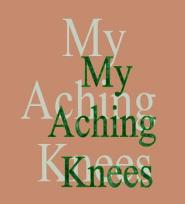Khloe Kardashian posted this photo of her supplement regimen that she’s taken to go with her on a trip to Armenia. “Vitamin party!”, she says. “I don’t have a pillbox because for all the pills I take, the pull box is large and bulky.” But is it too much?
It’s a mantra many of us heard on repeat as kids: “Take your vitamins!” Despite recent research that has questioned the effectiveness of vitamin supplements — and even their safety — Nielsen data has shown that the vitamin supplement industry is still growing.
MyAchingKnees comment: The effectiveness of supplements is going to largely be determined by the quality of manufacture. Don't expect your supplements to do wonders for you if you buy them off the shelf at the grocery store or one of those department store sized vitamin stores selling food grade products.
“Keeping Up with the Kardashians” star Khloe Kardashian seems to be doing her part to keep supplement sales up, posting a new photo on Instagram of all of the vitamins she took on on her current trip to Armenia. It’s hard to tell exactly how many vitamins she’s taking, but it appears to be about 23 a day. That’s right—a day.
Is that even healthy? While 23 vitamins a day is admittedly a little extreme, New York City registered dietitian Jessica Cording tells Yahoo Health that the right supplement intake really depends on a patient’s needs.
“Vitamin supplements are really to address gaps in your diet,” she says. “If you’re eating a balanced diet, you’re probably meeting your basic needs unless you have an underlying deficiency.”
MyAchingKnees comment: I believe we need to buy and eat the best foods we can find - et as low glycemic and as non-GMO as you can, but no matter how hard you work to buy and consume the best foods, you are still going to have some sort of nutritional deficiency. It's because the foods that are available now are greatly reduced in their nutritional value.
Which supplements do we actually need?
While there are a lot of supplements we don’t really need, Donald Hensrud, MD, medical director of the Mayo Clinic’s Healthy Living Program, tells Yahoo Health there are a few most people should consider.
Vitamin D
The first is vitamin D, which studies have shown can improve bone health, as well as muscle and immune function. “It’s been estimated that 20-50 percent of the U.S. population may have low vitamin D levels,” he says. “Now that people are aware of the relationship between sun exposure and skin cancer, they’re staying out of the sun more. That’s one of the sources of vitamin D.” He recommends that people look for a vitamin D3 supplement, aiming to take 1,000 units a day.
Calcium
The second supplement Hensrud recommends is calcium, which is widely known to help bone health. However, he notes that too much calcium has been linked with heart disease, so it’s best to stick with the recommended daily allowance (1,000 mg a day for most adults).
Probiotics
Cording suggests that people also consider taking a probiotic supplement. “So much of our health relies on the health of our gastrointestinal tract,” she says. “Keeping that in working order is important.”
And yes, it’s possible to take too many supplements!
While some supplements can be beneficial to your health, both Cording and Hensrud warn that it’s possible to take too many vitamins — and the fallout of that overdose depends on what kind of vitamins you take. Many water-soluble vitamins like C and B will just move through your body when taken in excess. “With many supplements, you’re pretty much paying for expensive urine,” says Cording.
There are a few water-soluble vitamins to be wary of, though. Hensrud points out that ingesting too much vitamin B6 can cause nerve problems and overdosing on niacin may lead to liver damage or even liver failure.
Large doses of fat-soluble vitamins like A, E, D, and K will store in your body fat and can cause problems ranging from gastrointestinal distress to more serious issues. Two clinical studies conducted in the mid-1990s on the effects of beta-carotene and vitamin A supplements on smokers were halted after participants showed an increased risk of lung cancer, heart disease, and death.
While some vitamin supplements can enhance your overall health, both experts say it’s most important to get your recommended vitamins and minerals from a diet heavy in fruits and vegetables. “A plant-based diet with a variety of foods from different sources goes a long way toward reducing the risk of cancer, heart disease, and other health issues,” says Hensrud.
Interested in trying new supplements to fill gaps in your diet? Consult your doctor first to make sure there aren’t any potential interactions with any medication you may be taking.
MyAchingKnees comment: By all means, consult your Doctor. I'm sure he has a huge background in nutritional medicine and is not beholding to any prescription medications companies (sarcasim font).


